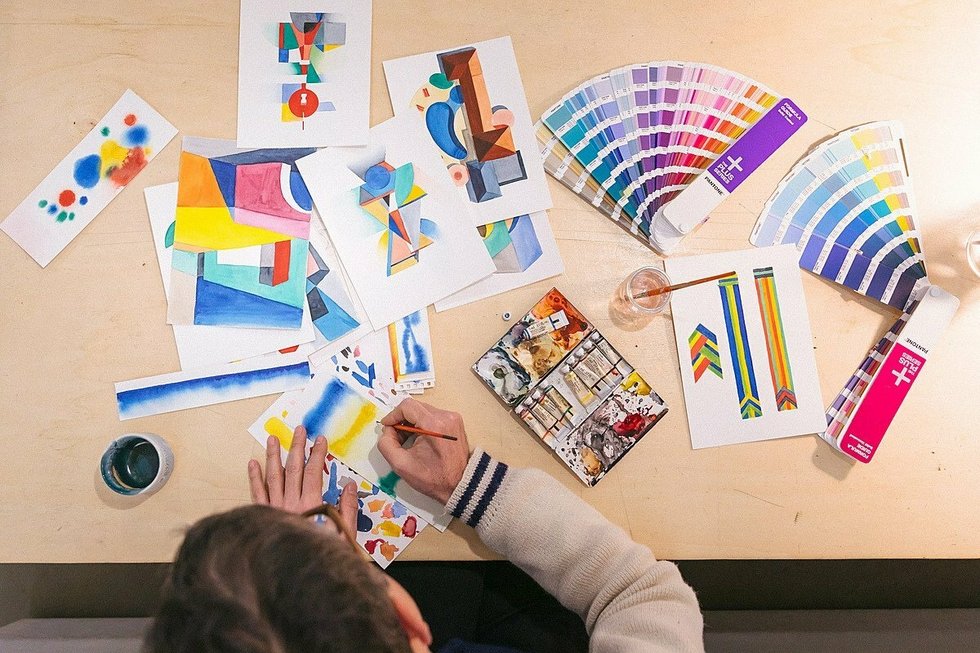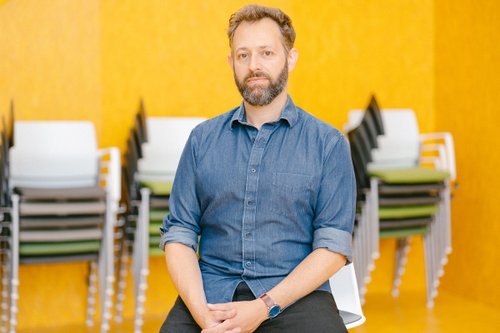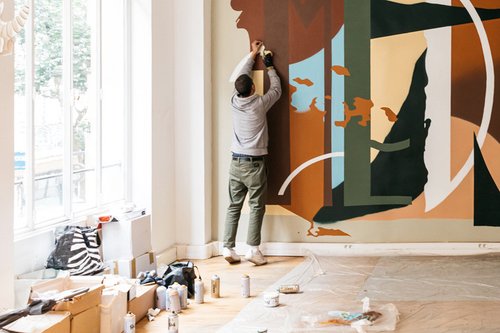Learn to boost your creativity (and let go of your fears)
Feb 21, 2022
4 mins


Photographe chez Welcome to the Jungle

Freelance Content Creator
No one is immune to the effects that negative feedback can have on their creativity. This is the very issue that concerns Danielle Krysa, the author of Your Inner Critic is a Big Jerk. She too has found herself facing this over the course of her career as an illustrator, writer and speaker, and has discovered that often there’s no harsher critic of your work than yourself. In her book, Krysa offers advice to help you to unlock your creativity when this happens.
Learn how to silence the inner voice that’s undermining your creativity and to turn your fears into action.
1. Everyone is creative
Everyone is born with an imagination and the need to create. The artist Pablo Picasso once famously said that “every child is an artist, the problem is how to remain one once we grow up.” Krysa argues that children who are allowed to have creative confidence, and are encouraged to pursue and implement different ideas from an early age, continue to show that confidence in adulthood. But, what can we do if this isn’t the case for us? Don’t fret! Krysa argues that we are all capable of making up for lost time:
Undertake small projects that require a bit of creativity. These can be everyday things such as walking around the block in search of items that grab your attention and that can later be used in small pieces of art.
Own your creativity. We have to remember that “being creative” doesn’t have to mean painting portraits or writing best-sellers. Every single one of us has a talent. Krysa suggests identifying it through small projects. “Think about when you were young, at the age when you used to draw, write, sing and put on plays with the one and only goal of having fun,” she says.
2. Stop making excuses
Alright, yes, we know you might be snowed under with work and you haven’t bought groceries for over a week, but if you want to have time for your creativity, you have to actually find the time. As the author explains, your inner critic will always find the perfect excuse to waste time and procrastinate. Fortunately, Krysa has a series of tools for tackling this
Ditch your excuses. “There are many valid excuses you can turn to, but many people obviously manage to overcome these,” the author explains. To do this, think about the excuses you use and identify or name them so you can switch them off whenever they start to cross your mind.
Include creativity as part of your routine. There are so many things to do every day it’s easy just to give up. But this is a major mistake! Analyze how you spend your time and evaluate how you can find the space to hone your talents. You could set aside Saturday afternoons or simply watch less TV. The power is in your hands.
Set deadlines. Fix a date in your calendar to have finished your project – come what may. Having a deadline will encourage you to continue pursuing your goal.
Find a space. Reserve a corner in a certain room and have all the necessary materials there laid out so you have them to hand.
Get into a habit. Being committed to a routine will help you to live in the moment and ensure that creativity becomes a part of your daily life. For example, you could pledge to do something creative at least once a week.
Surround yourself with creative people. Sign up to painting classes, attend talks, go to exhibitions and socials in your area where you can meet other creative people. Creating what the author calls a “creative tribe” will reinforce your habits and will help you to develop a network of contacts in your area.
3. Stop saying failure, start saying feedback
According to the author, it doesn’t matter if you’ve studied at an art school or have taught yourself, the aim is to push yourself and strive for a better version of yourself. However, it’s only natural to feel insecure and to fear failure during the process. To overcome these, you first have to accept there are no such things as errors; there are only what the author calls “creative potholes.” According to Krysa, we only really fail when we don’t try: everything else is just part of the process. Bear in mind that:
Failure can inspire you to keep on working. Going wrong can be a way of exploring your creative universe. Change your concept of “failure” and start seeing it as just another part of learning.
Failure teaches you that not all avenues are for you and gives you the opportunity to discover new ways of expressing yourself that you wouldn’t have considered otherwise.
If you receive negative criticism regarding your work, take it as feedback that can help you to improve, learn and make progress).
4. Tear down your creative blocks
Creative blocks happen. It’s as simple as that. The faster you accept that these are a part of the creative process, the sooner you’ll stop fearing them. But you have to manage them so they don’t work against you. Krysa teaches us how to deal with these moments, drawing on her experience and that of many other artists:
Accept that nothing is perfect. Don’t let your fear of imperfection be a stumbling block on the way to creativity. Understand that mistakes can also bring a certain beauty. Accepting imperfection is a huge step toward starting to create with no fears.
Go out for a walk. This is such a simple tip. If you’re stuck, go for a random walk and stretch your legs). This way, you won’t just clear your mind, you’ll also increase blood flow and also oxygenate your brain, enabling ideas to flow once again.
Set rules. According to Krysa, one of the best ways of avoiding creative blocks is to set boundaries and work within them. Having rules to follow can help you to learn how to discard projects that are going nowhere or seek help from someone from your “creative tribe.”
Eliminate the source of your creative blocks. Creative blocks can be caused by many different things. Therefore, the sooner you identify them, the quicker you’ll be able to take steps to remedy them. You may even be the cause of these creative blocks if you are sabotaging yourself with negative messages – either by listening to criticism from outside or because you yourself feel like you’re not advancing. It doesn’t matter what the cause is, what’s important is to recognise it.
As you can see, being a creative person isn’t easy; quite the opposite. It’s demanding but also thrilling and rewarding. So the next time that little voice inside you tries to sabotage your projects, don’t listen to it. Instead, start to implement all the tips you’ve just read. Make your inner critic work for you – not against you.
Translated by Jamie Broadway
Photo: Welcome to the Jungle
Follow Welcome to the Jungle on Facebook, LinkedIn, and Instagram and subscribe to our newsletter to get our latest articles every week!

More inspiration: Creativity

5 books to boost your creativity at work
Creativity at work is important, but sometimes we aren't inspired by our daily lives. We've curated a list of books to kickstart your creative mind!
Oct 04, 2023

How creativity became corporate religion
By idolizing the image of the feverishly driven artist, capitalism created new ways to exploit workers
Sep 05, 2023

Take a walk to boost your health and creativity
The simple act of taking a walk improves our general wellbeing, focuses our attention and boosts our creativity.
Apr 14, 2021

Costume drama: exploring the creative process with designer Lorna Mugan
She’s been nominated for a Bafta and an Emmy, but it’s unlikely you’ll recognise her face. Meet Lorna Mugan, a costume designer from Donegal.
Oct 12, 2020

In lockdown and running out of ideas? Six tips to stay creative
Whether it’s through creating art or just finding inventive ways to adapt at work to this strange time, being creative is a new survival skill.
May 12, 2020
The newsletter that does the job
Want to keep up with the latest articles? Twice a week you can receive stories, jobs, and tips in your inbox.

Looking for your next job?
Over 200,000 people have found a job with Welcome to the Jungle.
Explore jobs